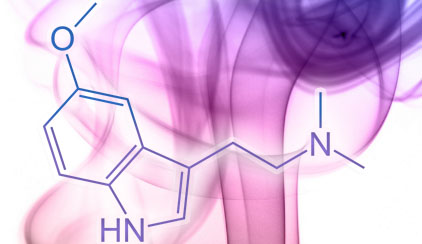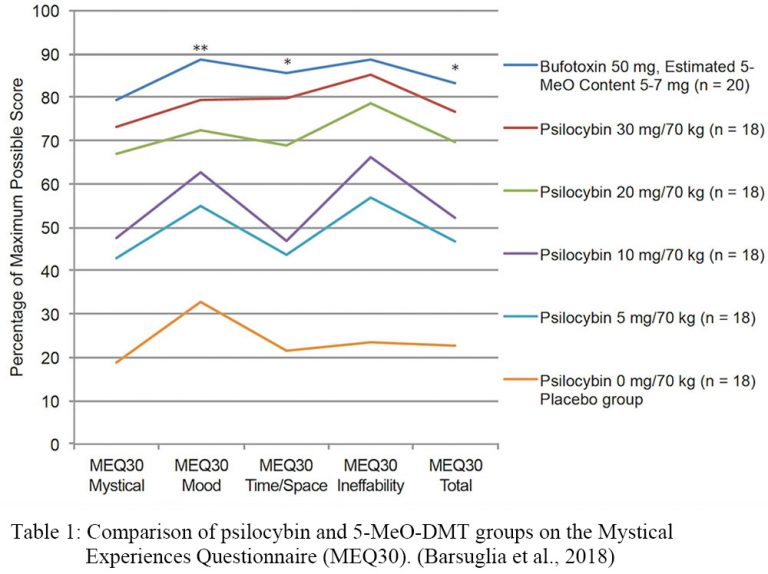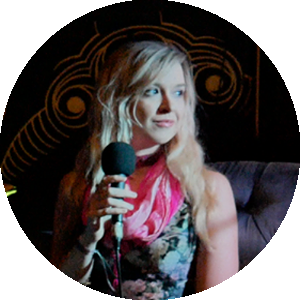Human brain effects of 5-methoxy-N,N-dimethyltryptamine (5-MeO-DMT)
5-MeO-DMT has been identified to hold potential as a novel psychotherapeutic tool with potential benefits over other psychedelics. 5-MeO-DMT is an under-researched psychedelic with great potential. PRISM is pioneering research into this promising and fascinating compound alongside Swinburne University, and the US not-for profits; Usona Institute and Hefter Institute.

5-MeO-DMT: A promising and under-researched psychedelic
5-MeO-DMT is a fast-acting, potent and unique psychedelic that can be found in plants, animals and can be synthesised. 5-MeO-DMT can evoke mystical experiences and provide subjective effects similar to, yet unique from, other psychedelics (Barasuglia, 2018). 5-MeO-DMT may produce higher rates of complete mystical experience when compared to psilocybin. 5-MeO-DMT has a history of observational and anecdotal human use suggesting potential psychotherapeutic utility. The most common route of administration in naturalistic settings is inhalation of vaporised compound, inducing an altered state of consciousness which lasts up to 20 minutes.

The Potential of 5-MeO-DMT: Current research
A single dose of 5-MeO-DMT in naturalistic settings has sustained effects on life satisfaction, mindfulness-capacities and improvement in psychopathological symptoms (Uthaug et al., 2019). 5-MeO-DMT has been shown to increase neurogenesis - the development of new neurons, and to enhance neuronal cell survivability and provide benefit to the immunomodulatory system (Lima da Cruz et al., 2018). In a survey of 362 people who had used 5-MeO-DMT, 80% of those interviewed reported improvements in symptoms of anxiety and depression (Davis et al., 2019).
Our Study at Swinburne University of Technology
Human brain and Wellbeing effects of 5-MeO-DMT in healthy participants
Our study will investigate intramuscular (IM) administration of 5-MeO-DMT, which would provide a therapeutic window of 40-60 minutes. This modular duration of 5-MeO-DMT may provide some benefit by condensing the psychotherapy duration to 60 minutes instead of 4-6+ hours as with some classic psychedelics, such as psilocybin (Uthaug et al, 2020). Further research is required to bring 5-MeO-DMT into the lab and study the effects of IM administration in a clinical setting to ensure safety and ascertain the benefits of the approach. It is our hope that the proposed study will generate information on the effects and safety of 5-MeO-DMT and support the development of controlled clinical studies to treat mental health conditions in the future.
As of July 2022 we have full ethics approval from the Swinburne University Human Research Ethics committee (HREC), a major milestone for research into this novel compound.
Core Study Team

Prof Susan Rossell
Cheief Investigator
Professor Susan Rossell is a cognitive neuropsychologist and Professorial Research Fellow at Swinburne’s Centre for Mental Health. She also holds adjunct positions at Monash Alfred Psychiatry Research Centre and at St Vincent’s Health.
Professor Rossell’s research focuses on understanding the cognitive and neurobiological processes involved in psychosis and more recently the therapeutic potential of psychedelics.
Prior to coming to Australia, Professor Rossell studied at the University of Manchester, the Institute of Psychiatry (part of King’s College London) and Oxford University. She gained extensive experience in neuroimaging while undertaking a position at London’s world-renowned Functional Imaging Lab. In 2000 Professor Rossell was awarded a prestigious International Wellcome Post-doctoral Fellowship during which she spent time at Macquarie University. Before joining Swinburne, she also held roles as Head of the Cognitive Neuropsychiatry Department at the Mental Health Research Institute of Victoria and at Monash Alfred Psychiatry Research Centre.

Dr Malin Uthaug
Study Co-Ordinator
Malin completed her PhD at the department of Neuropsychology and Psychopharmacology, at the faculty of Psychology and Neuroscience at Maastricht University, The Netherlands. As part of her PhD, she investigated the short-term and long-term effects of Ayahuasca and 5-MeO-DMT in naturalistic settings, while simultaneously initiating several other studies on the psychedelic substance Mescaline and the breathing practice known as Holotropic Breathwork (HB).Malin is currently working as a Postdoctoral researcher at The Centre for Psychedelic Research, at Imperial College London, led by Dr. Robin Carhart-Harris. Here she is investigating the effects of 5-MeO-DMT and Holotropic Breathwork on mental health related variables, emobodiment, brain activity and consciousness.
Besides being a researcher, Malin is an editor for the ‘Journal of Psychedelics Studies’, a board member of the American podcast-show known as Psychedelics Today, and the co-founder of the Norwegian Association for Psychedelic Science whose main aim is to educate the general public as well as researchers, and mental health practitioners in Norway about psychedelics.

Dr Martin Williams
Executive Director of PRISM
Martin Williams is a research fellow in pharmaceutical sciences at Monash University. His interests in psychology and pharmacology have led him towards the multidisciplinary study of psychoactive compounds and their roles in contemporary society. Martin is a founding member of Entheogenesis Australis (EGA), an educational charity focused on the historical use and societal impacts of medicinal plants and chemicals, and founding President of Psychedelic Research in Science & Medicine.
Martin is co-lead on the St Vincent’s Hospital Melbourne Phase 2 trial of psilocybin-assisted therapy for depression and anxiety associated with terminal illness, and co-investigator on the upcoming Melbourne multi-institutional psilocybin trial for treatment-resistant depression and Edith Cowan University MDMA trial for PTSD. Martin is a regular speaker and commentator on psychedelic science in Australia, and reviewer of psychedelic science submissions for several international journals. In his spare time, Martin has an avid interest as a pilot in aircraft.

Melissa Warner
Secretary of PRISM
Melissa is an advocate for innovative solutions for mental health and is on a mission to cultivate an evidence and experience-based understanding of consciousness. Melissa is Secretary of Psychedelic Research in Science and Medicine, a meditation and integration coach at Signs of Life Psychology, co- founder of The Australian Psychedelic Society, and is a Director of the Cyberdelic Society.
Melissa is an experienced public speaker and science communicator. Melissa supports the initiation and execution of Australian psychedelic research trials at PRISM and is a post-graduate psychology student at The University of Melbourne and Swinburne University. Alongside her research interest in 5-MeO-DMT, Melissa is developing the development of a therapeutic virtual reality program to support psychedelic-assisted therapy through meditation training and immersive visuals.
In her creative time, Melissa enjoys yoga, poetry, dance and painting.
Research for a better future
Current and future Australian research in this space will offer a crucial pathway for the provision of psychedelic-assisted therapy and to develop our understanding of consciousness itself. Notably, none of the current research into psychedelic-assisted treatments for mental illness in Australia is receiving government funding. With your support, our research paves the way for establishing evidence-informed psychedelic-assisted treatments
